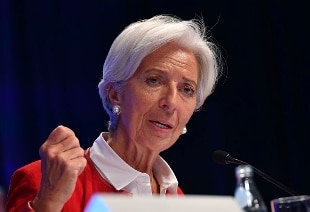- Banks go up waiting for the ECB. For Huawei, another 90 days without bans
- Eurozone inflation stops. Piazza Affari runs waiting for the ECB
- Piazza Affari leads the ascent in Europe Low inflation, increases the pressure on the ECB
- Waiting for the ECB bazooka European stock markets are rising
- ECB stimuli already in September. Milan leads the European squares
- The ECB promises stimuli, the stock exchanges bounce. Exploit Mediaset: + 10%
Share
04 September 2019The appointment of Roberto Gualtieri as Minister of the Economy in the M5s-Pd government "is good for Italy and is good for Europe". This was said this morning by Christine Lagarde, president-designate of the ECB, on the sidelines of an intervention in the European Parliament. Precisely because in Rome in these hours the composition of the new government is being decided, Gualtieri, MEP of the Democratic Party re-elected in this legislature and reconfirmed as president of the Commission for economic and monetary problems in the European Parliament, was absent from the hearing. A scheduled meeting, in which the Economic Affairs Committee itself had a busy exchange with Lagarde in view of the Strasbourg plenary vote which should confirm it as president of the ECB. And it is precisely at the end of the hearing that Lagarde responded to a reporter's question about the possible appointment of Gualtieri to the Economy in the Italian government.The audition of Lagarde
"I believe the opinion of the European Parliament is important in my nomination process and in this I intend to introduce you and submit my curriculum to the extent that I consider it suitable for the presidency of the ECB. I will promote my values through commitment, agility in responding to challenges and inclusiveness ", the designated president of the ECB said at the opening of the economic committee hearing in the European Parliament. It had to be Roberto Gualtieri himself who introduced it, but he was urgently summoned to Italy and left Ludek Niedermayer (Christian Democrats) with the role of speaker for today's hearing. A delicate audition, in which Lagarde began by talking about the objectives and tasks of the next ECB management, focusing on the economic prospects of the Eurozone and its past experience as Executive Director at the International Monetary Fund (IMF), participating in the strengthening of the economic and monetary union within the EU.
New challenges
The president of the ECB has not shirked the debate. "The challenges that justify the current policy of the European Central Bank have not disappeared. The economy of the euro area has to face some short-term risks, especially related to external factors and inflation persists under the objectives of the ECB." Lagarde added: "I agree with the Governing Council's view that a highly accommodative policy is justified for a longer period to bring inflation below, but close to 2%".
The ECB responds to citizens
"The ECB responds to European citizens, not to states". Thus replied Christine Lagarde to the Northern League deputy Antonio Rinaldi, who asked her questions about her independence as designated president of the European Central Bank. "The independence of the ECB is fundamental to its credibility and political leaders must avoid trying to influence the Eurotower, the designated president of the ECB said." The question of the independence of the European Central Bank and of the ECB president is intrinsically linked to the credibility and effectiveness of the Central Bank. In the case of the ECB president - explained Lagarde - the law instructs the leaders of the member states not to exert any influence. This is extremely important because the ECB is an institution that serves citizens from the euro area, not the leaders of the Member States. He is responsible to citizens from the euro area through representatives of the European Parliament. This is something that is absolutely fundamental. Without this, I would not have accepted to consider my candidacy ".
Cryptocurrencies
Christine Lagarde then said she was in favor of "exploring" the idea put forward by Mark Carney of a digital currency issued by the main global central banks. "I am very fascinated by your proposal that some of the key central banks form a company and explore the creation of a common digital currency". According to Lagarde, Carney "proposes something similar in nature" to the Libra of Facebook, "but issued by central banks. I hope we can explore it." On crypto-currencies, the president-designate of the ECB explained that it is necessary to "distinguish" between digital currencies such as Bitcoins which are speculative and volatile instruments and "stable currencies that are a different animal and probably have a different future. Stable currencies, which whether Libra or the digital currencies of central banks, they must comply with all the rules and regulations that apply to these products "in terms of financial stability, money laundering and terrorist financing.

